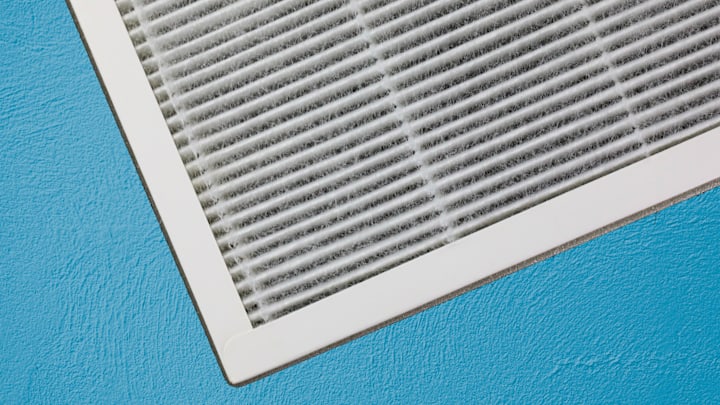You finally get around to changing your HVAC filter and find it covered in a layer of dust so thick that it looks like some sort of shaggy quadrilateral creature from a geometry teacher’s nightmare. Clearly, you should’ve replaced it earlier. But when, exactly?
The general guideline for an average air filter—be it for your HVAC system or just the AC—is every 90 days. That said, there are all sorts of variables that might make it necessary to shorten that timeline. One is the type of filter you’re using. According to Home Depot, fiberglass air filters are cheaper than pleated ones—but they typically only last about a month.
Where and with whom you live matters, too. If you’re in a city with lots of air pollution or a region where wildfires are common, for example, your filters might expire sooner than three months. The same goes for people with pets. Children and people with allergies are extra likely to be bothered by unclean air, so anyone who lives with them probably shouldn’t wait until day 90 to see if the filters need replacing.
Home Depot recommends removing your filter on a monthly basis and “hold[ing] it up to a light source. If the light doesn't pass through the filter, it’s clogged and needs to be changed.”
What happens if you don’t replace HVAC filters often enough?
As This Old House explains, the most obvious issue with delaying replacement is simply that your filter can’t do its job very well: The air in your home won’t be as clean as it could be. And since it’s more difficult for air to pass through a clogged filter, your HVAC system has to exert extra effort to do its job. Not only could this jack up your energy bill, but it could also eventually lead to a broken HVAC system.
Are renters responsible for replacing their own air filters?
It depends on your contract and your landlord. But in general, yes: It’s usually on renters to pay for and replace filters as needed. Landlords often switch them right before a new tenant moves in, and they may even provide you with specific filters they want you to use. If you’re not sure what your landlord expects (or is willing to give you), it’s always a good idea to ask them—or check your lease for details.
